- Home
- Charles L. Grant
The Orchard Page 5
The Orchard Read online
Page 5
I knew I hadn’t been eating right for a while; I knew that I’d been swearing to go on a real, honest-to-god diet if that’s what it would take to be human again; and I knew that the last time I’d said that was only Friday afternoon. When we were all at the orchard.
But you can’t lose fifty pounds in three days.
You just can’t.
Another stare at the window, another look at my stomach, and I started to run. I was scared. A million names of real and fake diseases tumbled over each other in their attempts to explain, and a million other reasons sounded just as bad.
You can’t lose fifty pounds in three days.
You just can’t, and expect to live.
When I got home, everyone was gone, there was no note, and I could smell a full turkey dinner cooking and baking in the kitchen. I didn’t go in. I ran upstairs to the bathroom, stripped off my clothes, and stood in front of the full-length mirror on the door.
“God,” I said. “God, Jesus, what …”
Not only wasn’t I fat like I used to be, there wasn’t even any sagging. My skin was normal, no folds where the weight used to be, no wattles on my neck, no creases … no nothing.
“Oh, god. Oh, Jesus.”
I sat on the floor, trying to get a breath and stop the tears that were there suddenly, then grabbing onto my arms, my legs, to keep them from shaking themselves right out of their sockets.
I felt the cold, but I was used to it.
And I heard the buzzing in my ears, the murmuring of a thousand voices so low I couldn’t understand them.
And I looked at myself again and something heaved in my stomach; I crawled over to the toilet, threw up the lid, and leaned over the bowl. But nothing came out because there was nothing inside, and the retching went on so long I started to whimper at the pain, at the burning, at the tiny flecks of black I saw floating in the water.
I don’t think I’ve cried so much since I was a baby.
I could smell turkey and bread dressing and hot rolls and fresh butter.
The light dimmed before I was able to move again, and the first thing I did was put my clothes back on, not caring how I looked, only wondering who I could go to, who I could find who would tell me what was wrong.
The second thing I did was smash the mirror with everything I could pull from the medicine cabinet.
The house was dark.
I could smell pumpkin pie and ice cream and whipped cream and fresh cider.
I stumbled into the living room and stared at the phone.
I couldn’t call Mike, I couldn’t call Rich, I couldn’t call Amy because she would only want to talk about how her life was over.
Mary wasn’t home.
Stick was.
“What do you want,” he said flatly.
“Stick, I’m in trouble, man, real trouble.”
He didn’t say anything, and it didn’t hit me right away that he was still pissed about my leaving the hospital without talking to Mike’s folks.
“Stick, honest to god, I think I’m in big trouble.”
“No shit,” he said, his voice oddly slurred. “But in case you hadn’t noticed, friend, some of us other guys got troubles, too. You just don’t seem to care anymore.”
If he had been in the room, I would have knocked out his teeth. “Stick, you don’t get it, man. I—”
“I ain’t got the time,” he said then. “I just slashed my wrists.”
“Jesus, that isn’t funny, Stick.” There was no response. “Stick? Stick, goddamnit, I said that isn’t—” The receiver dropped on his end and I could hear it swinging back and forth, slamming against something, hollow and loud. “Stick! Jesus, Stick!”
If the front door hadn’t opened right away, I think I would have smashed right through it.
Two blocks, two long and hard blocks, and I jumped the stairs to Reese’s porch and started pounding on the door. No one answered. I yelled, I rang the doorbell, I ran to the windows that looked in on the front room, cursing because the curtains were drawn, finally finding a crack wide enough to look through.
He was there. I could see his feet poking out of the foyer, I could see the receiver swinging from its cord and hitting the wall, and I could see on one knee what looked like blood.
I know what I should have done. I know I should have busted a window and called the police, or gone to a neighbor’s and begged for help. But I ran instead, like I’d killed him myself, staying to the shadows, ducking behind poles and trees and even hedges when a car went by, turning around whenever I saw someone walking toward me.
By the time I ran out of wind and my legs had started to scream, it was twilight.
Soft colors, soft breeze.
And I was in the orchard.
I’m not a coward, you know. I know when to fight and when to back off. But when I looked around and realized where I was, I couldn’t stop myself from wishing my mother was here.
Most of the trees were dead. Gnarled, tall, without the grace of a tombstone to lend them some purpose. Their rows were ragged, their trunks bent and angled, and the shadows they cast were like no shadows I’ve ever seen. They were cold, and the air around touched with the feel of a ghost or a bad dream. The grass grew, but not high; there were weeds without blossoms; the rocks were small, the stones sharp; and the dead leaves blown in here from the woods to the north were always brittle, and bladed, even after it rained.
I didn’t like it here, didn’t know why I’d come when I should have been with Mary, or Aunt May, or even Uncle Gil.
Anyone who could tell me what the hell was going on.
Twilight deepened to dusk.
I turned to leave, holding my stomach and deciding that maybe I should be in the hospital. The doctors there would know what was wrong with me; they would listen to my problems and they’d cure me, really cure me. They’d take me apart and put me back together, and when I got out I’d be just as good as new.
The thought made me smile, and with one hand out to push away the branches, I took one step, and saw Mary’s tomb.
It was lying in a clear space, like an aisle between rows of trees, and when it registered that I wasn’t seeing things, that I wasn’t losing my mind, I started to lose my temper, to search for a name to put blame to for playing this sick joke as I ran over and dropped beside it, leaning close because the light was going fast and I wanted to be sure it hadn’t been hurt.
“Jesus,” I said.
“Jesus!” I shouted, and jumped to my feet, fists ready, teeth bared, daring the goddamned bastards to come out of hiding and face me like men.
The pastels faded and shaded to black.
Something moved.
I froze, even though I wasn’t sure I’d heard anything, a hand out over Mary as if to protect her.
Then it moved again, just off to my left.
I looked up at the twisted branches and they were hands reaching for my scalp; I backed away from the boles that were scaled black on the sides as if marked by a great fire; I stumped over a rock half buried in the ground and told myself that if I didn’t stop it, I was going to scare myself to death.
A twig snapped.
A foot scuffed through dead leaves.
I turned quickly, breath ice in my throat, and saw nothing, saw no one, not even my shadow.
“Who the hell is it?” I demanded, amazed that my voice didn’t crack. “Is this your idea of a joke? Is it? Well, it ain’t goddamned funny!”
Far behind me, on the highway, a truck sounded its horn.
A soft voice in front, a whispering, words I couldn’t make out.
“All right, knock it off. You think it’s funny? You know Stick is dead? Huh? Do you bastards know Stick is dead?”
Something flew overhead, low and banking sharply, and I ducked, lifted a shoulder, and waved a frantic hand to drive it away. It came by again, wings short and chopping the air, dropping me to one knee while I tried to move backward. A third time, and it was gone, black into black, leaving me pantin
g and feeling incredibly stupid.
“Idiot,” I muttered as I struggled to stand. It was only a bat, after a bug I couldn’t see. Feeling like a class-A jerk, I dusted my jeans off, rolled my shoulders, and moved over to Mary to see how I was going to get the tomb back home. I figured they must have used a truck; they must have broken the lock on the shed and carried her out in a pickup.
But I didn’t know anyone who owned one, and no one, not even Stick, had known what I was doing.
It’s a dream, I told myself then; it’s nothing but a stupid dream and you’re going to wake up any minute now. Any minute now you’re going to get out of bed and go down to breakfast and tell Aunt May you’re on another diet. And Stick will be there, telling you you’re an asshole because you won’t give up Mary.
I stood over her image and shook my head, reaching out to touch her, and yanking my hand back when I felt the cold wood. Looked up to the moon—it was new, just a crescent, but it and its stars were bright enough to let me see the lines in Mary’s face, and the shadow by the tree.
It wasn’t Stick Reese, because he was dead.
It wasn’t Mike, and it wasn’t Richard, and it wasn’t Uncle Gil.
And it certainly wasn’t Mary, come to bring me to her bed.
There was little form, less substance; there was no movement at all. In a gap between trees, only vague ripplings in black to show it was there at all, the suggestions of a dress or cloak, the outline of a covered head.
When the breeze gusted, it swayed.
And it appeared to be listening.
I cleared my throat, wiped my mouth, and tried real hard not to think about psychotic ax- and knife-wielding killers who preyed on innocent college juniors, slashing their throats and leaving them in deserted fields and orchards to be found days later, picked to pieces by the crows.
I looked over my shoulder, figuring the distance to the road and the odds of my being able to get there safely, assuming I didn’t fall, assuming I wasn’t caught.
The moon touched the orchard with traces of dead silver; the wind touched the air with traces of screams.
I eased back a step and looked to the shadow to see if it had followed.
It hadn’t.
It just stood there.
I thought about claiming I wasn’t alone, my friends were here with me and there was no chance it could take me without getting hurt itself; I thought about claiming I had a gun and wouldn’t hesitate to use it.
Standing there.
Sweat dropped into my eyes. I shook my head, rubbed a hand over my face, and looked again to see how much closer it had gotten.
It hadn’t.
It was gone.
Panic tightened my groin. My fingers clenched, stiffened, clenched again as I turned a quick tight circle, staring into the dark, looking for the shadow, finally closing my eyes and releasing a breath in a barely audible moan. Christ, I thought; and I punched my chest once, punishment for the way my imagination had scared me. I was alone. I knew it. Because everyone else had left me.
“All right,” I said briskly, clapping my hands and giving myself a shake. “All right, let’s get moving here, huh, Johns? Let’s get our ass in gear.”
First I’d take care of Mary, then get to the hospital and take care of myself.
Slowly I walked around the huge block of wood, peering closely again to be doubly sure nothing had been damaged. It was hard, though. I kept hearing things behind me, feeling things watching, feeling the nightcold as it sifted down from the moon. I knelt at the head, at each side, and finally the foot, suddenly awfully tired and holding onto the top corners when I pushed myself up.
And looked at my thin hands, at the thin pale shadow that draped over Mary.
I don’t know what happened, but I felt really dizzy and fell forward, my hands landing on either side of Mary’s hips to keep me from landing on her, one knee cracking against the rim.
The top moved.
The wind whispered.
I eased myself away so carefully I almost cramped, knowing something was wrong because that wasn’t any top—it was all one big piece, with nothing inside.
I reached out, pulled back, dried my hands on my jeans, and reached out again like I was ready to put my whole hand in fire. Mary, I thought; Mary, please help me. And I pushed a corner, hard. Nothing happened, and I laughed dryly. So I pushed a second time—and the scrape of wood against wood dropped me to my knees. I looked up and saw the shadows standing under the trees. I looked down and saw white bone gleaming through my skin.
Then I pushed the corner again, just enough to see that the wood block was hollow.
And I heard myself screaming as I leaned over, and looked in.
I don’t care for the dark, but I think now it protects me.
Just as I think that whatever lives in the orchard has turned everything around, and somehow filled me the day I ran through it so I couldn’t take any more—Mike’s worries about Amy, Stick’s rotten home, even Rich’s silent gloating over the prize he thought he’d won.
And my own troubles, most of them minor though I wouldn’t believe it.
Whatever it is, it filled me with emptiness, and I cast emptiness back.
They’ll never find the car that killed Richard, or learn why Mike lost control and Stick Bed a razor.
I pretended to care, and they knew I was lying and couldn’t escape the cold I gave them in return.
And Mary, my Mary with the flaming red hair, would probably run if I tried to explain and showed her the tomb and all the letters I never sent her that I keep in my drawer.
She would run, she would hate me … unless Aunt May is wrong and there are real miracles after all, and Mary, my Mary, would see how much I hurt and know how to save me from the dark in the orchard.
I can only wait to find out.
I can only lie beneath her image to stay away from the cold, out there, in the shadows, and pray that my clothes aren’t more baggy still, that I really can feel flesh still clinging to my bones … and pray even harder that the darkform in my arms that I use for a bed and pillow is only a dream slowly rotting to nightmare.
I can only wait, and be patient.
For my Mary’s asleep.
I know.
I hear her breathing.
Part Two
I See Her Sweet and Fair
Rising like a nightflower against the full of the moon, lifting slowly to a grey silhouette . . .
Brett saw the light from the living room window and almost jumped from the chair in his haste to avoid it. Ice spiderwalked his spine, his palms grew moist, and when he licked at his lips, he felt them dry and cracking.
It’s only the moon, idiot, he told himself harshly; it’s only the damned moon.
But he pulled the shade down so quickly it snapped up again, rattled around the roller, cord and grip cracking sharp against the pane. He grabbed for the woven loop, cursed when it rapped his knuckle, and finally trapped it in both hands. A deep breath. A sigh. He lowered the shade a second time and held it until he was sure it wouldn’t fly free again.
He knew he was being foolish, but it was increasingly something he couldn’t fight off. The light the moon dropped on the carpet unnerved him, and though he ordered himself to stop behaving like a child, he couldn’t help a glance into each of the corners. His eyes closed briefly; his lungs filled with a breath that he held until his hands finally stopped their trembling. Then he turned away from the window, took his chair by the hearth, and picked up the newspaper where he’d dropped it just before.
The headlines were familiar, as were the stories below them. He looked for the comics, but they didn’t amuse him; he scanned the sports section, but knew none of the teams; he tried to decipher the stock market for nearly ten minutes, giving up with a grunt when his eyes started to water.
A book was next, jammed between the cushion and the armrest. He couldn’t remember where he’d left off, so he skimmed until he discovered something unfamiliar. After three p
ages he put it back down—the names meant nothing, and he had no idea why they were saying those things about one another.
The television was broken.
The radio was in the kitchen.
And his son was out with Evelyn Zayer, a girl who spent more time on the telephone than any forty he had ever known. Leslie, when he wasn’t complaining about Brett’s refusal to let him have an apartment of his own, laughingly called his good looks the family curse; Brett only hoped the boy would remember to finish his education and not run off to get married, and leave him alone.
An hour, and he kept glancing over his shoulder at the shade, at the dark window. Seeing the girl standing—
“Jesus, will you stop it, for god’s sake?”
He got up, slapped the back of the chair and strolled into the kitchen, switched on the light and opened the refrigerator. His stomach told him he had better eat something soon or he’d start in earnest with the snacks and blow his diet all to hell. But nothing he saw appealed to him, nothing prompted his taste buds to wake up and demand. The cupboards were the same, and so was the pantry.
“But I’m hungry,” he insisted.
No, you’re not, you’re bored, he answered with a sour grin, and decided to cure it by getting the hell out and going for a walk.
He took his windbreaker from the hall closet, turned on a few lights in case Les came home before he did, and left, testing the door twice to be sure it was locked. Another grin, this one quick and bright, and he stepped down to the walk, looked up at the moon.
Out here, under the elm that had taken over the front yard, it seemed perfectly normal. Huge, almost white; and he couldn’t understand why something so lovely had bothered him tonight, and had bothered him every night for at least the past week.
Not true, he thought then; not true at all.
He could mark the moment it began from the first time he had seen his son in what they used to call action.
It was last Friday, and he had taken Denise Quarell to the movies, to the Regency Theater, newly constructed on an old parking lot east of the Mariner Cove. It was a beautiful place, in brick and white trim, and the only indication it was a theater at all was the ticket booth in front. There was no marquee, no posters, the walls flanking the entrance broken only by curtained windows that looked into the lobby.

![[Oxrun Station] The Orchard Read online](http://i1.bookreadfree.com/i/03/17/oxrun_station_the_orchard_preview.jpg) [Oxrun Station] The Orchard
[Oxrun Station] The Orchard![Riders in the Sky - [Millennium Quartet 04] Read online](http://i1.bookreadfree.com/i/03/20/riders_in_the_sky_-_millennium_quartet_04_preview.jpg) Riders in the Sky - [Millennium Quartet 04]
Riders in the Sky - [Millennium Quartet 04]![Chariot - [Millennium Quartet 03] Read online](http://i1.bookreadfree.com/i/03/19/chariot_-_millennium_quartet_03_preview.jpg) Chariot - [Millennium Quartet 03]
Chariot - [Millennium Quartet 03]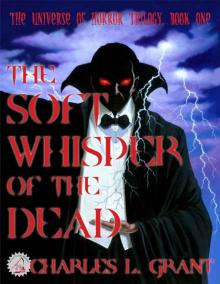 The Universe of Horror Volume 1: The Soft Whisper of the Dead (Neccon Classic Horror)
The Universe of Horror Volume 1: The Soft Whisper of the Dead (Neccon Classic Horror)![[Oxrun Station] Dialing The Wind Read online](http://i1.bookreadfree.com/i/03/19/oxrun_station_dialing_the_wind_preview.jpg) [Oxrun Station] Dialing The Wind
[Oxrun Station] Dialing The Wind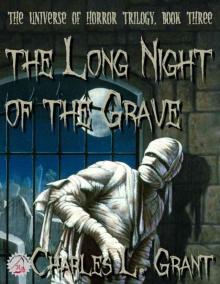 The Universe of Horror Volume 3: The Long Night of the Grave (Neccon Classic Horror)
The Universe of Horror Volume 3: The Long Night of the Grave (Neccon Classic Horror)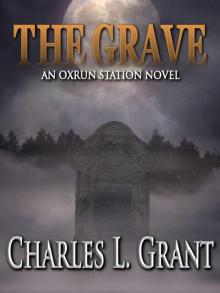 The Grave - An Oxrun Station Novel (Oxrun Station Novels)
The Grave - An Oxrun Station Novel (Oxrun Station Novels)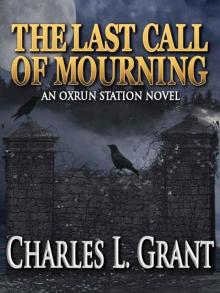 The Last Call of Mourning - An Oxrun Station Novel (Oxrun Station Novels)
The Last Call of Mourning - An Oxrun Station Novel (Oxrun Station Novels)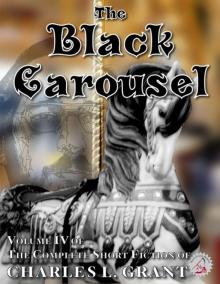 The Complete Short Fiction of Charles L. Grant, Volume IV: The Black Carousel
The Complete Short Fiction of Charles L. Grant, Volume IV: The Black Carousel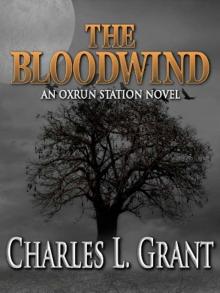 The Bloodwind - An Oxrun Station Novel (Oxrun Station Novels)
The Bloodwind - An Oxrun Station Novel (Oxrun Station Novels)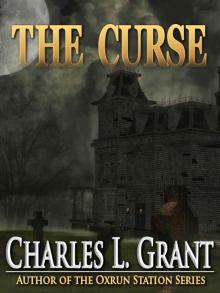 The Curse
The Curse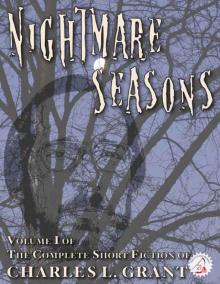 The Complete Short Fiction of Charles L. Grant Volume 1: Nightmare Seasons (Necon Classic Horror)
The Complete Short Fiction of Charles L. Grant Volume 1: Nightmare Seasons (Necon Classic Horror)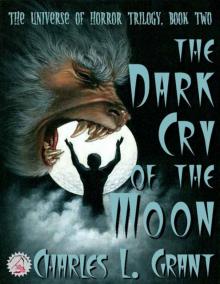 The Universe of Horror Volume 2: The Dark Cry of the Moon (Neccon Classic Horror)
The Universe of Horror Volume 2: The Dark Cry of the Moon (Neccon Classic Horror)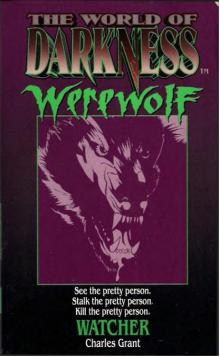 Watcher: Based on the Apocalypse (World of Darkness : Werewolf)
Watcher: Based on the Apocalypse (World of Darkness : Werewolf)![[Oxrun Station] The Bloodwind Read online](http://i1.bookreadfree.com/i/03/25/oxrun_station_the_bloodwind_preview.jpg) [Oxrun Station] The Bloodwind
[Oxrun Station] The Bloodwind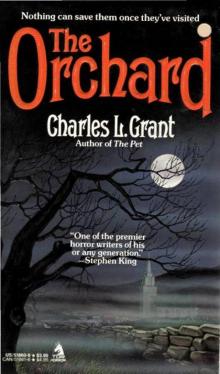 The Orchard
The Orchard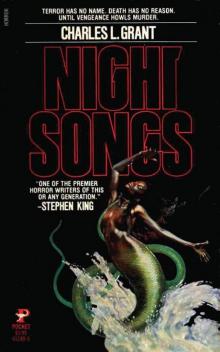 Night Songs
Night Songs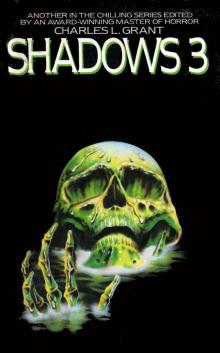 Shadows 3
Shadows 3![Symphony - [Millennium Quartet 01] Read online](http://i1.bookreadfree.com/i1/04/02/symphony_-_millennium_quartet_01_preview.jpg) Symphony - [Millennium Quartet 01]
Symphony - [Millennium Quartet 01] The Hour of the Oxrun Dead (Necon Classic Horror)
The Hour of the Oxrun Dead (Necon Classic Horror)![In the Mood - [Millennium Quartet 02] Read online](http://i1.bookreadfree.com/i1/03/31/in_the_mood_-_millennium_quartet_02_preview.jpg) In the Mood - [Millennium Quartet 02]
In the Mood - [Millennium Quartet 02]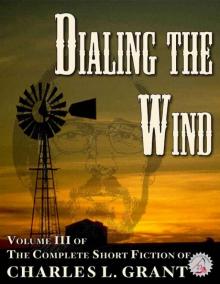 The Complete Short Fiction of Charles L. Grant Volume 3: Dialing the Wind (Neccon Classic Horror)
The Complete Short Fiction of Charles L. Grant Volume 3: Dialing the Wind (Neccon Classic Horror)![[Oxrun Station] The Last Call of Mourning Read online](http://i1.bookreadfree.com/i2/04/05/oxrun_station_the_last_call_of_mourning_preview.jpg) [Oxrun Station] The Last Call of Mourning
[Oxrun Station] The Last Call of Mourning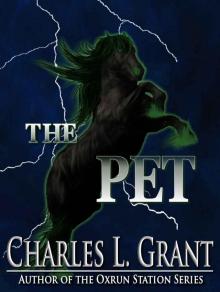 The Pet
The Pet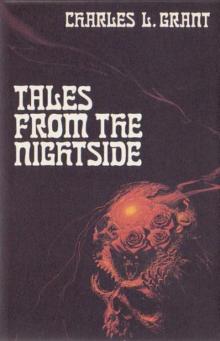 Tales from the Nightside
Tales from the Nightside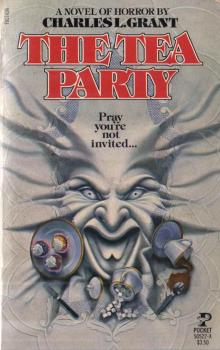 The Tea Party - A Novel of Horror
The Tea Party - A Novel of Horror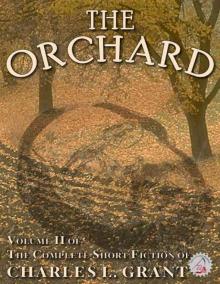 The Complete Short Fiction of Charles L. Grant Volume 2: The Orchard (Necon Classic Horror)
The Complete Short Fiction of Charles L. Grant Volume 2: The Orchard (Necon Classic Horror) Whirlwind
Whirlwind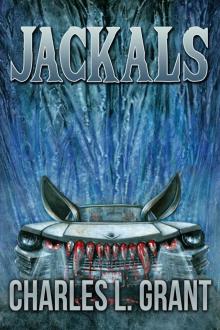 Jackals
Jackals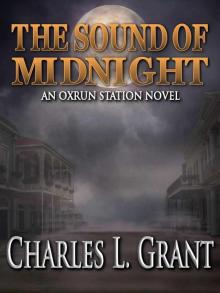 The Sound of Midnight - An Oxrun Station Novel
The Sound of Midnight - An Oxrun Station Novel